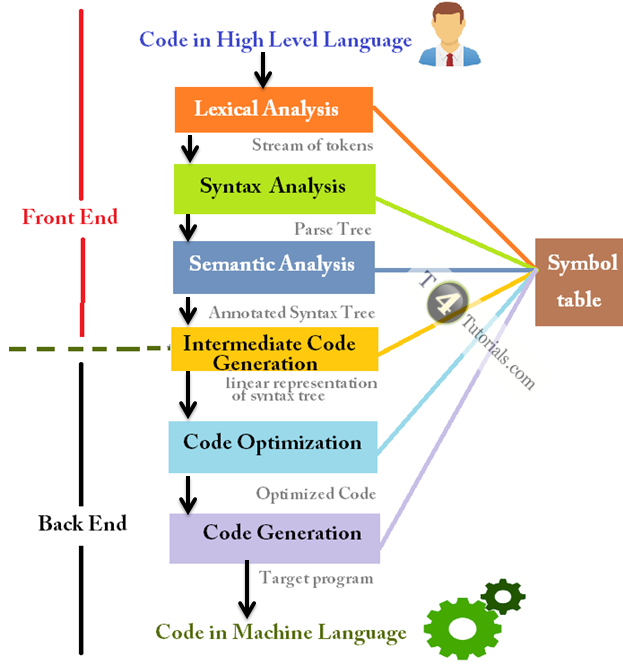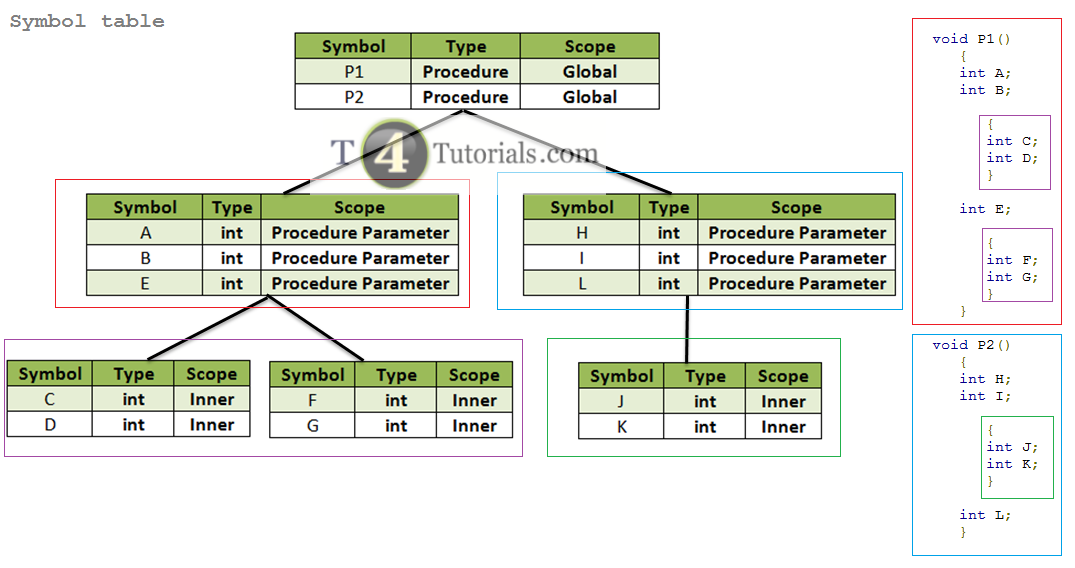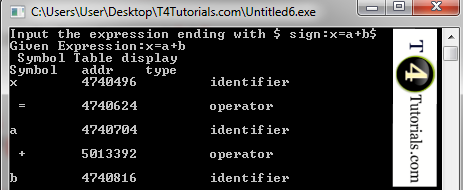If you are here to read about the symbol table, then it means that you already know about the basic flow of all the phases of the compiler as demonstrated in the diagram. If you want to read about phases of the compiler and their relation with symbol table then must read the article “phases of compiler“.

Symbol table in Compiler Design
The compiler creates and maintains a data structure to store information about the occurrence of various entities such as variable and function names, objects and classes, etc. This kind of data structure is known as a symbol table.
C++ Code
|
1 2 3 4 5 6 7 8 9 10 11 12 13 14 15 16 17 18 19 20 21 22 23 24 25 26 27 28 29 30 |
void P1() { int A; int B; { int C; int D; } int E; { int F; int G; } } void P2() { int H; int I; { int J; int K; } int L; } |
The symbol table for C++ Code

Operations on Symbol table
Allocate Operation on Symbol table
Allocate Operation can be performed on a symbol table to allocate a new empty symbol table.
Insert Operation on Symbol table
Insert Operation can be performed on a symbol table to insert a name in a symbol table and return a pointer to its entry.
Set_attribute Operation on Symbol table
Set_attribute Operation can be performed on a symbol table to associate an attribute with a given entry.
Get_attribute Operation on Symbol table
Get_attribute Operation can be performed on a symbol table to get an attribute associated with a given entry.
Lookup Operation on Symbol table
Lookup Operation can be performed on a symbol table to search for a name and return a pointer to its entry.
Free Operation on Symbol table
Free Operation can be performed on a symbol table to remove all entries and free the storage of a symbol table.
Some other operations just like delete operations can also be performed on the symbol table.
Implementation of Symbol table
Symbol tables can be implemented with different kinds of data structure techniques. Some of the techniques are mentioned below;
- LinkedList
- Hash Table
- Tree
A basic example of creating the symbol table of C++ Code
int t4tutorials(int x, int y)
{
int addition = 0;
addition = x + y;
return sum;
}
Symbol Table for the code shown above.
| NAME | TYPE | SCOPE |
| t4tutorials | function | global |
| x | int | function parameter |
| y | int | function parameter |
| addition | int | local |
Symbol table implementation with hashing in C++
|
1 2 3 4 5 6 7 8 9 10 11 12 13 14 15 16 17 18 19 20 21 22 23 24 25 26 27 28 29 30 31 32 33 34 35 36 37 38 39 40 41 42 43 44 45 46 47 48 49 50 51 52 53 54 55 56 57 58 59 60 61 62 63 64 65 66 67 68 69 70 71 72 73 74 75 76 77 78 79 80 81 82 83 84 85 86 87 88 89 90 91 92 93 94 95 96 97 98 99 100 101 102 103 104 105 106 107 108 109 110 111 112 113 114 115 116 117 118 119 120 121 122 123 124 125 126 127 128 129 130 131 132 133 134 135 136 137 138 139 140 141 142 143 144 145 146 147 148 149 150 151 152 153 154 155 156 157 158 159 160 161 162 163 164 165 166 167 168 169 170 171 172 173 174 175 176 177 178 179 180 181 182 183 184 185 186 187 188 189 190 191 192 193 194 195 196 197 198 199 200 201 202 203 204 205 206 207 208 209 210 211 212 213 214 215 216 217 |
// C++ program to implement Symbol Table #include <iostream> using namespace std; const int MAXIMUM = 100; class Node { string identifier, scope, type; int Line_Number; Node* next_Node; public: Node() { next_Node = NULL; } Node(string key, string value, string type, int Line_Number) { this->identifier = key; this->scope = value; this->type = type; this->Line_Number = Line_Number; next_Node = NULL; } void print() { cout << "Identifier's Name:" << identifier << "\nType:" << type << "\nScope: " << scope << "\nLine Number: " << Line_Number << endl; } friend class SymbolTable; }; class SymbolTable { Node* header[MAXIMUM]; public: SymbolTable() { for (int i = 0; i < MAXIMUM; i++) header[i] = NULL; } int hashf(string id); // hash function bool T4Tutorials_insertion(string id, string scope, string Type, int Line_Number); string T4Tutorials_search(string id); bool deleteRecord(string id); bool modify(string id, string scope, string Type, int Line_Number); }; // Function to modify an identifier bool SymbolTable::modify(string id, string s, string t, int l) { int index = hashf(id); Node* start = header[index]; if (start == NULL) return "-1"; while (start != NULL) { if (start->identifier == id) { start->scope = s; start->type = t; start->Line_Number = l; return true; } start = start->next_Node; } return false; // id not found } // Function to delete an identifier bool SymbolTable::deleteRecord(string id) { int index = hashf(id); Node* T4Tutorials_Temporary_Variable = header[index]; Node* par = header[index]; // no identifier is present at that index if (T4Tutorials_Temporary_Variable == NULL) { return false; } // only one identifier is present if (T4Tutorials_Temporary_Variable->identifier == id && T4Tutorials_Temporary_Variable->next_Node == NULL) { T4Tutorials_Temporary_Variable->next_Node = NULL; delete T4Tutorials_Temporary_Variable; return true; } while (T4Tutorials_Temporary_Variable->identifier != id && T4Tutorials_Temporary_Variable->next_Node != NULL) { par = T4Tutorials_Temporary_Variable; T4Tutorials_Temporary_Variable = T4Tutorials_Temporary_Variable->next_Node; } if (T4Tutorials_Temporary_Variable->identifier == id && T4Tutorials_Temporary_Variable->next_Node != NULL) { par->next_Node = T4Tutorials_Temporary_Variable->next_Node; T4Tutorials_Temporary_Variable->next_Node = NULL; delete T4Tutorials_Temporary_Variable; return true; } // delete at the end else { par->next_Node = NULL; T4Tutorials_Temporary_Variable->next_Node = NULL; delete T4Tutorials_Temporary_Variable; return true; } return false; } // Function to T4Tutorials_search an identifier string SymbolTable::T4Tutorials_search(string id) { int index = hashf(id); Node* start = header[index]; if (start == NULL) return "-1"; while (start != NULL) { if (start->identifier == id) { start->print(); return start->scope; } start = start->next_Node; } return "-1"; // not found } // Function to T4Tutorials_insertion an identifier bool SymbolTable::T4Tutorials_insertion(string id, string scope, string Type, int Line_Number) { int index = hashf(id); Node* p = new Node(id, scope, Type, Line_Number); if (header[index] == NULL) { header[index] = p; cout << "\n" << id << " insertion"; return true; } else { Node* start = header[index]; while (start->next_Node != NULL) start = start->next_Node; start->next_Node = p; cout << "\n" << id << " insertion"; return true; } return false; } int SymbolTable::hashf(string id) { int asciiSum = 0; for (int i = 0; i < id.length(); i++) { asciiSum = asciiSum + id[i]; } return (asciiSum % 100); } int main() { SymbolTable st; string check; cout << "**** SYMBOL_TABLE ****\n"; // T4Tutorials_insertion 'if' if (st.T4Tutorials_insertion("if", "local", "keyword", 4)) cout << " -successfully"; else cout << "\nFailed to T4Tutorials_insertion.\n"; // T4Tutorials_insertion 'number' if (st.T4Tutorials_insertion("number", "global", "variable", 2)) cout << " -successfully\n\n"; else cout << "\nFailed to T4Tutorials_insertion\n"; // T4Tutorials_search 'if' check = st.T4Tutorials_search("if"); if (check != "-1") cout << "Identifier Is present\n"; else cout << "\nIdentifier Not Present\n"; // delete 'if' if (st.deleteRecord("if")) cout << "if Identifier is deleted\n"; else cout << "\nFailed to delete\n"; // modify 'number' if (st.modify("number", "global", "variable", 3)) cout << "\nNumber Identifier updated\n"; // T4Tutorials_search and print 'number' check = st.T4Tutorials_search("number"); if (check != "-1") cout << "Identifier Is present\n"; else cout << "\nIdentifier Not Present"; return 0; } |
Basic Symbol table Program in C
Write a program for implementing a Symbol Table using C.
|
1 2 3 4 5 6 7 8 9 10 11 12 13 14 15 16 17 18 19 20 21 22 23 24 25 26 27 28 29 30 31 32 33 34 35 36 37 38 39 40 41 42 43 44 45 46 47 48 49 50 51 |
// symbol table Implementation #include<stdio.h> #include<math.h> #include<string.h> #include<ctype.h> #include<stdlib.h> void main() { int x=0, n, i=0,j=0; void *mypointer,*T4Tutorials_address[5]; char ch,T4Tutorials_Search,T4Tutorials_Array2[15],T4Tutorials_Array3[15],c; printf("Input the expression ending with $ sign:"); while((c=getchar())!='$') { T4Tutorials_Array2[i]=c; i++; } n=i-1; printf("Given Expression:"); i=0; while(i<=n) { printf("%c",T4Tutorials_Array2[i]); i++; } printf("\n Symbol Table display\n"); printf("Symbol \t addr \t type"); while(j<=n) { c=T4Tutorials_Array2[j]; if(isalpha(toascii(c))) { mypointer=malloc(c); T4Tutorials_address[x]=mypointer; T4Tutorials_Array3[x]=c; printf("\n%c \t %d \t identifier\n",c,mypointer); x++; j++; } else { ch=c; if(ch=='+'||ch=='-'||ch=='*'||ch=='=') { mypointer=malloc(ch); T4Tutorials_address[x]=mypointer; T4Tutorials_Array3[x]=ch; printf("\n %c \t %d \t operator\n",ch,mypointer); x++; j++; }}}} |
Output
